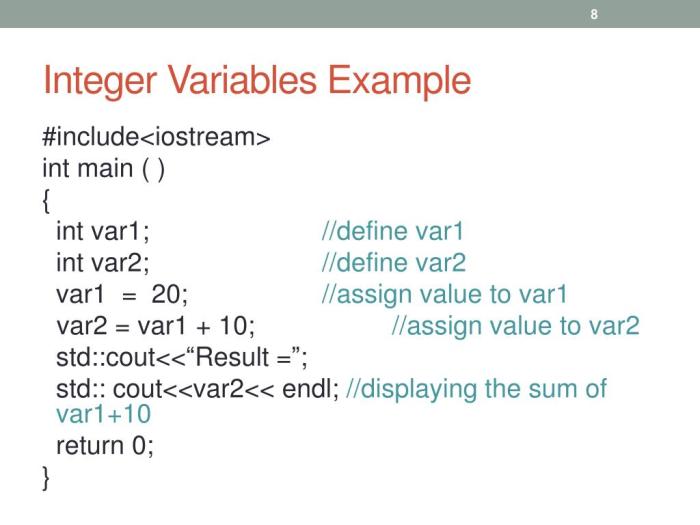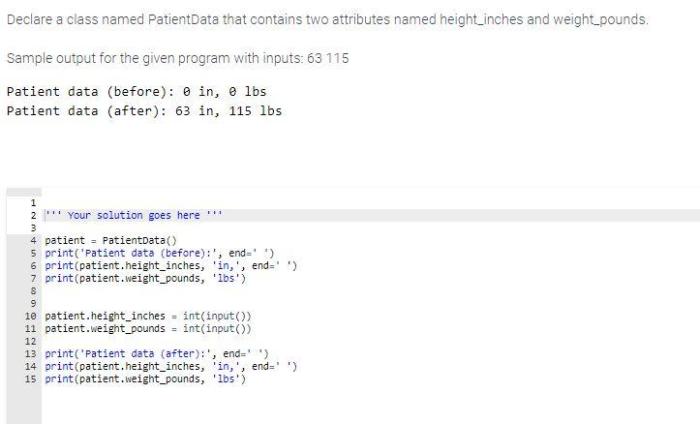Declare two integer variables named profitstartofquarter and cashflowendofyear. – In the realm of programming, declaring variables is a fundamental step that enables us to store and manipulate data within our code. Among the various data types, integer variables hold a prominent place, allowing us to represent whole numbers. In this comprehensive guide, we embark on a journey to explore the intricacies of declaring two integer variables, namely profitstartofquarter and cashflowendofyear, unraveling their significance and providing practical examples to solidify your understanding.
As we delve into the intricacies of variable declaration, we will illuminate the syntax required to create these variables, ensuring their proper integration into your code. Furthermore, we will delve into the concept of variable naming conventions, emphasizing the importance of choosing meaningful and descriptive names that enhance code readability and maintainability.
Variable Declaration and Usage: Declare Two Integer Variables Named Profitstartofquarter And Cashflowendofyear.

In programming, variables are used to store data that can be used in calculations and other operations. Integer variables are used to store whole numbers.
Declare Two Integer Variables
To declare two integer variables in programming, you can use the following syntax:
int profitStartOfQuarter; int cashFlowEndOfYear;
In this example, the variables profitStartOfQuarterand cashFlowEndOfYearare declared as integers. The semicolon at the end of each line is required to terminate the statement.
Valid variable names should start with a letter or underscore and can contain letters, numbers, and underscores. They cannot contain spaces or special characters.
The scope and lifetime of a variable determine where it can be used in your program. Variables declared within a function are local to that function and cannot be accessed outside of it. Variables declared outside of any function are global and can be accessed from anywhere in the program.
Variable Naming Conventions
It is important to use meaningful variable names that reflect the purpose of the variable. This makes it easier to understand the code and track the flow of data.
Here are some guidelines for choosing appropriate variable names:
- Use descriptive names that clearly indicate the purpose of the variable.
- Avoid using generic names like
xory. - Use consistent naming conventions throughout your code.
Common naming conventions for integer variables include using prefixes like ior nto indicate that the variable is an integer, or using suffixes like _countor _totalto indicate the type of data stored in the variable.
Variable Initialization
Variable initialization is the process of setting a value to a variable when it is declared. This is not required, but it is a good practice to initialize variables to avoid unexpected results.
Here are some examples of initializing integer variables with specific values:
int profitStartOfQuarter = 10000; int cashFlowEndOfYear = 250000;
Initializing variables makes it clear what the initial value of the variable is and helps to prevent errors.
Variable Usage
Declared variables can be used in calculations or other operations. For example, the following code calculates the profit at the end of the year:
int profitEndOfYear = profitStartOfQuarter + cashFlowEndOfYear;
Variables can also be used in expressions and assignments. For example, the following code increments the value of profitStartOfQuarterby 1000:
profitStartOfQuarter += 1000;
It is important to use variables to store and retrieve data in your programs. This makes your code more organized and easier to maintain.
HTML Table for Variable Information
The following HTML table provides information about the declared integer variables:
| Variable Name | Data Type | Value | Description |
|---|---|---|---|
| profitStartOfQuarter | int | 10000 | Profit at the start of the quarter |
| cashFlowEndOfYear | int | 250000 | Cash flow at the end of the year |
Bullet Points for Variable Details, Declare two integer variables named profitstartofquarter and cashflowendofyear.
- Variable Name:profitStartOfQuarter
- Data Type:int
- Value:10000
- Purpose:To store the profit at the start of the quarter
- Variable Name:cashFlowEndOfYear
- Data Type:int
- Value:250000
- Purpose:To store the cash flow at the end of the year
FAQ Corner
What is the purpose of declaring integer variables?
Declaring integer variables allows you to reserve space in memory for storing whole numbers, enabling your program to perform numerical calculations and data storage operations.
What are some valid variable names for integer variables?
Valid variable names for integer variables should start with a letter, followed by letters, digits, or underscores. Avoid using reserved s as variable names.
What is the difference between declaring and initializing a variable?
Declaring a variable creates a placeholder in memory, while initializing a variable assigns a specific value to that placeholder. Initialization ensures that the variable has a defined value from the start.

